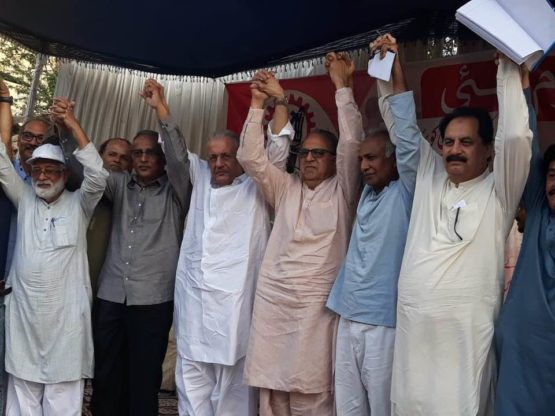- About
- Topics
- Picks
- Audio
- Story
- In-Depth
- Opinion
- News
- Donate
- Signup for our newsletterOur Editors' Best Picks.Send
Read, Debate: Engage.
| topic: | Political violence |
|---|---|
| located: | Pakistan |
| editor: | Shadi Khan Saif |
On Tuesday, 9 May, former Pakistani Prime Minister Imran Khan was taken into custody by paramilitary forces from the premises of the Islamabad High Court, in what many are calling a display of high-handedness that undermines the rule of law.
The ruling alliance of multiple parties, Pakistan Democratic Movement (PDM), is being blamed for the political mess, allegedly under direction from the military establishment, which celebrated the use of state power in a straightforward legal case. This has resulted in severe backlash from Khan's supporters nationwide, particularly towards the country's powerful military establishment.
However, there is no justification for expressing violent discontent towards public and private individuals and properties, and Khan's party, PTI, cannot escape responsibility for the losses they caused.
The country's Supreme Court has now intervened to calm tensions and steer the situation towards a sensible legal pathway, but a lot of damage has already been done, and the violent acts committed by the protesting women and the angry mobs who torched public and private property have set a terrible precedent for the future. This is not how a democratic state should function.
In addition to the political turmoil, the country is also facing economic challenges, with millions of poor people at risk of being pushed into poverty and hunger. Imran Khan has been granted interim bail for two weeks in the multi-million dollar Al-Qadir Trust property case, in which he is accused of using state funds to compensate a real estate tycoon for land that would be used to build a new university. He has denied any wrongdoing.
On Wednesday, Khan was also indicted by a Pakistani court in an unrelated case for unlawfully selling state gifts during his premiership between 2018 and 2022. These corruption charges are just two of more than 100 cases registered against Khan since his ouster in April 2022.
The situation in Pakistan highlights the need for an independent and fair judicial system that can deliver transparent judgments and the importance of a security establishment that stays out of politics. It is also crucial for political leaders to remain faithful to the people and the law and to avoid abusing their power for personal gain. All in all, the lesson is clear: hold the law supreme and apply it with justice to all individuals and institutions without discrimination or favour.
Photo by Sameer Akhtari

